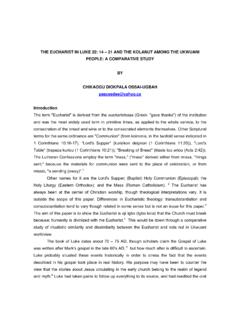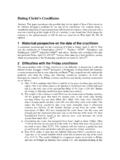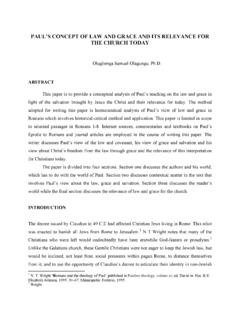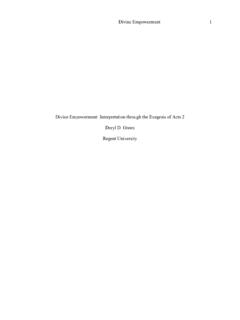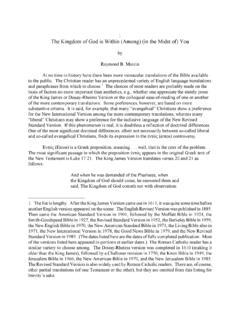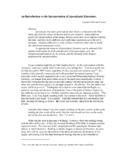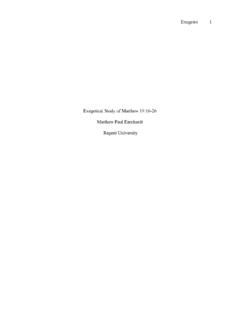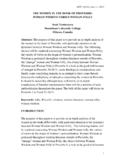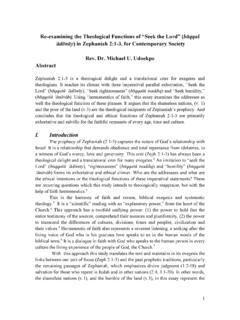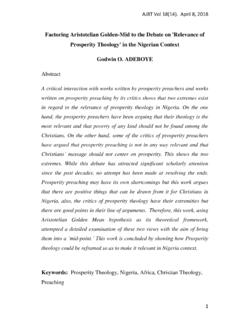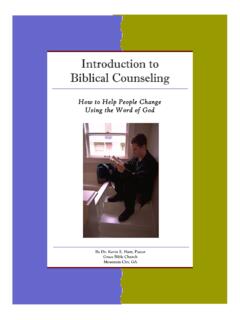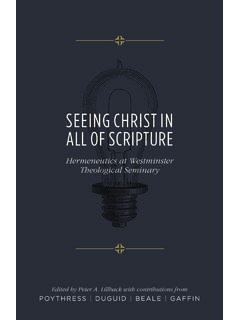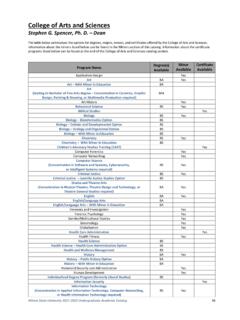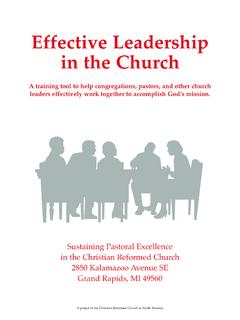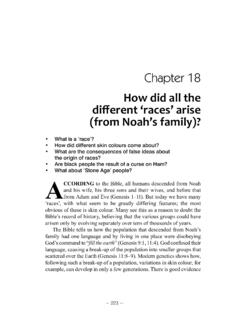Transcription of A Theology and Philosophy of Christian Education
1 A Theology and Philosophy of Christian Education Dabai Bamalyi Introduction Evangelical Christians have a record of uneasiness with theological Education . Sometimes this uneasiness had been expressed in an outright hostility towards theological schools but more frequently, it has taken the form of a caution, even slight nervousness in sponsoring seminary Education . Today's colleges are failing in two principle ways: (i) What they are teaching, (ii) how they are teaching it. Debates over the mission of theological colleges continue to swirl. To inform the future of graduate theological training there is need to study its past. 1 The purpose of this essay is to study the historical background of Christian Education , theological and secular concepts of Education , discover current trend, then give a biblical prescription.
2 _____. 1. Hard and R. Albert Mogler, Jr., Education in Evangelical Tradition, Baker Books, 1996, See Forward. Historical Background The shifts in Christian Education , which began in the fifth century, lasted until the beginning of the sixteenth century. Factors that contributed to the languishing of Christian Education in the sixteenth century era: the clergy began to dominate more and more, while the responsibility and influence of individual laity diminished. The union of states and church tended to eliminate high moral stands, since it erased any important differences between believers and unbelievers. The institutional church continued to exist and even to christianize the barbaric tribes, but Christian Education suffered enormously.
3 It was during this period in Europe that men like Charles the great Frank Law, and later, Alfred of England attempted educational reforms. Due to a religious diversion from biblical Theology , a sort of popular Theology developed that combined Christian doctrines and In the 11th Century, scholasticism, developed. The basic scholastic thought in the use of reason to determine the truth of the scriptures, and ultimately to give a rational content of faith, it formal beginnings are identified with St. Anselm, who tried to prove the existence of God by purely rational means. Abelard stressed the rational approach in considering the topical question of the 12th century, the question of universals.
4 The early church fathers notably; Augustine, incorporated Plato's doctrines and Neo-platonic thought into Christian Theology . The 13th century was marked out with the works of Aristotle. Thomas Aquinas is regarded as the greatest achievement of the scholastic age and the ultimate triumph of the effort to christianize Aristotle. Too much emphasis in reason brought a shipwreck in Christian 2. Eleanor Daniel, John , Charles Gresham, Introduction to Christian Education , Standard publishing 1970, 3. From the Concise Columbia Encyclopaedia. Copyright 1991 by Columbia University Press. Sighted at 4/11/2005. 2. The Renaissance, beginning in the latter part of 13th century developed the concept of natural science which brought on the decline of scholastic metaphysics; although it approach continued to be followed in politics and laws yet in 1879 when Pope Leo XIII.
5 Proclaimed the system of Aquinas to be the official catholic Philosophy . Renaissance laid the foundation for humanistic tradition in Education . It exalted the individual, and recovered the ancient languages and the classical literature of Greece and Rome. It was a secular movement in the main stressing the delights of living, the ideal of liberty and among those who found Christian morality too binding a freedom from moral In early 19th century faith in scripture as an authoritative sense, revelation of God was discredited according to Louise Berkhof, human insight became the standard of religious thought . Men ceased to recognize the knowledge of God as something that was given in Reason is not infallible and it must be used in line with This drifting gave birth to what is known today as postmodernism.
6 The ideal that there is no absolute truth is dependent on the individual. This is a clear shift from the John Dewey (1859 - 1952). Secular educational theory and practice began to launch out the independent of Theology , a trend best seen in John Dewey who reduced Philosophy to Education theory and dismissed all Theology as an obstructive influence in The trends in the first quarter of the 20th century that greatly affected the Christian Education movement are liberal and Neo-orthodox theologian. Their negative influences can be noted in seminaries, public colleges, sadly enough in the _____. 4. Eleanor Daniel, John W. Wade, Charles Gresham, op cit., 5. Louis Berhof, Systematic Theology , the banner of Truth Trust, 2000, pp.
7 19,20. 6. Michael Reid, Strategic Level Spiritual Warfare: A Modern Mythology? Xulon press, 2002, p. 34. 7. Eleanor Daniel, John , Charles Gresham op cit, 8. Shifts in curricular theory for Christian Education by Peter Deboer Professor of Calvin College. 10/10/2005. 9. What is Liberation Theology ? 2/11/2005. 3. Liberal/Neo orthodox Education : Neo-orthodox emphasise more on methods than preaching or teaching the word. Their method has to do with social gospel of feeding or clothing the poor, these methods can never bring salvation to the souls of men. Many churches borrow these ideal because they are marketable or attract crowds but have no knowledge of the saving grace of God. The major challenge in Christian Education is one's theological foundation.
8 As a matter of fact, one's theological belief has a bearing on the person's concept of Education , especially Christian Education . The liberal position is what has exposed people to biblical criticism, and the social gospel, leading some general positions, namely, God was seen as an impersonal or social concept. The Bible was looked upon as a source book of religious inspiration, containing legend, myth. Christ was seen as a great man, a wonderful moral teacher, but not deity. His death was not seen as sacrificial or substitutionary. This is share According to Eleanor et al; many of leaders of the religious educational movement accepted the liberal position in part or totally. This affected both Philosophy and procedure of religious Education .
9 Eleanor et al further explained in their book, how methods were borrowed from the progressive Education movement, associated with John Dewey, with its interest in child centeredness and the social project . Liberalism is what had led to the decline of the Sunday school Education movement. Today, churches are substituting Christian Education program, (Sunday school) with It is liberalism that has led the Christian educationalist into secularism, where humanism became the content of curriculum. Simply put, liberation Theology is an attempt to interpret scriptures through the plight of the poor largely with humanistic doctrines12. _____. 10. Eleanor, John W. Wade, Charles Gresham, op cit.
10 , p. 46. 11. What is Liberation Theology ? 12. What is Neo-orthodoxy? 2/11/2005. 4. Neo-orthodoxy fundamentally differs from orthodoxy with its approach to the doctrine of the word . The writer holds that the Bible is the revealed word of God; that it was given by inspiration of God (2 Timothy 3:16-17; 2 Peter 1:20,21). Neo-orthodox denies this approach of inerrancy of inspiration. In orthodox circles, the Bible is regarded as the complete, closed and sufficient revelation of God. Neo-orthodoxy believes that the Bible is a medium of revelation. (While orthodox believes it is revelation) revelation is therefore dependent on experience; making truth a mystical and not a concrete fact.
